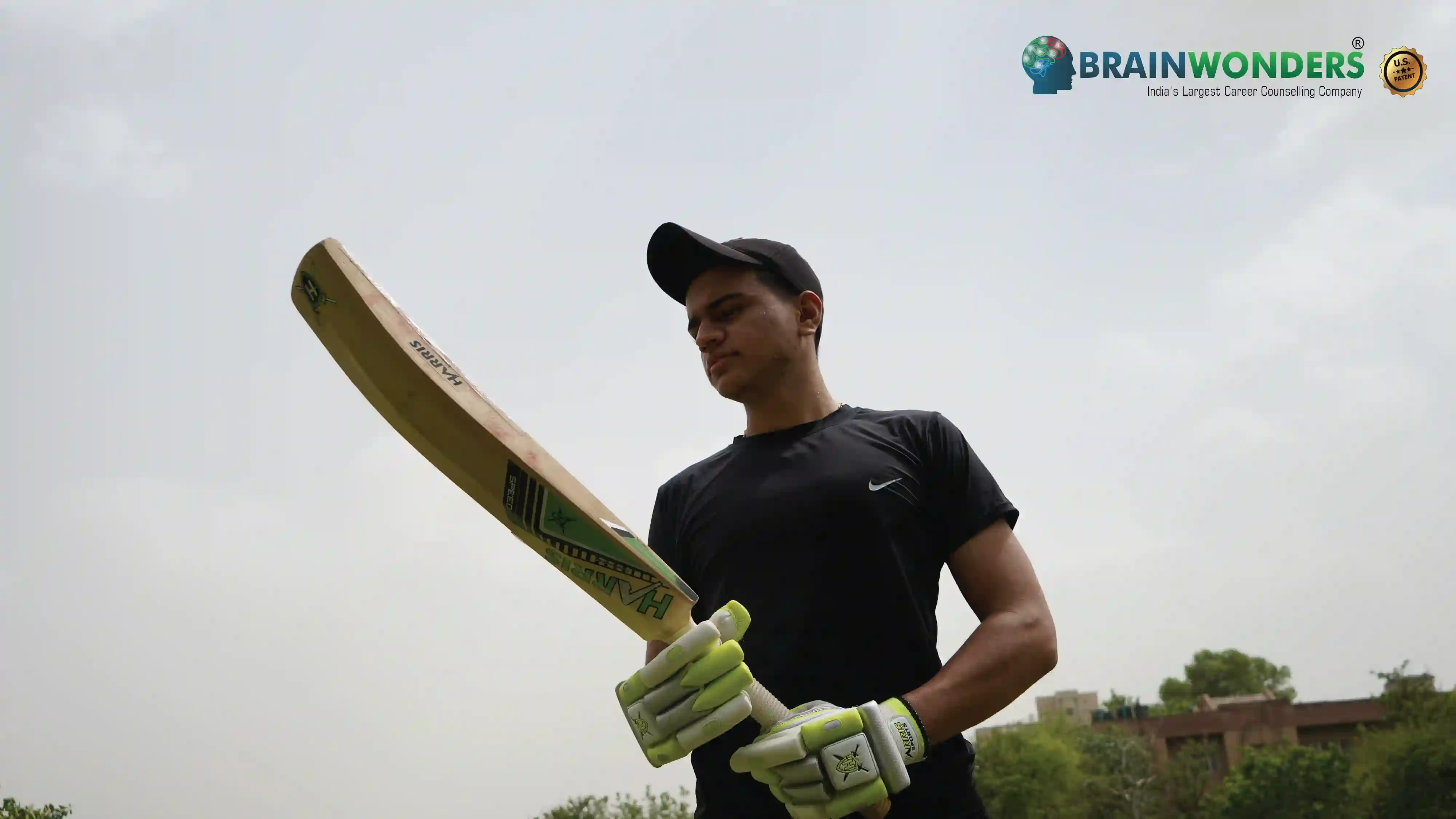How to become a Cricketer
Overview, Courses, Exam, Colleges, Pathways, Salary

Overview
Who is Cricketer ?
Cricketers are sportsmen who play cricket professionally. While most professional cricketers play for their club domestically, some play nationally and internationally. They can be a part of the national, state, or regional teams on a domestic level. This sport can be played in many formats, including twenty-twenty, test matches, one day international (ODI) matches and T20 international matches. Being a cricketer, one must have the physical stamina to withstand extensive training to prepare for competitive cricket matches. This career demands that the individual be consistent and committed towards the sport throughout their professional lives.
As cricketers have to place a lot of emphasis on physical fitness, they have their own training and dietary routines to follow. Cricketers spend most of their time on the cricket grounds during the cricket season, whether on the pitch or the pavilion. In India, the Board of Control for Cricket of India (BCCI) is the governing body in charge of organising domestic and international cricket competitions.
Typical day at work
What does Cricketer do?
- Regularly practice the batting, bowling, and fielding skills
- Work on building physical strength and stamina through exercise and a healthy diet
- Take part in the promotional activities of the cricket team
- Discuss strategies and tactics with the team in preparation for competitive matches
- Review own performance in the game to identify areas that need to be improved
- Participate in competitive matches alongside the cricket team
- Travel to match venues to play competitive matches
- Consult physiotherapists in case of any injuries
Abilities and Aptitude needed
What are the skills, abilities & aptitude needed to become Cricketer?
Cricketers must first and foremost be physically fit, with the endurance to train and play the sport continuously throughout their careers. Additionally, they should be skilled at batting, bowling, fielding, and wicket-keeping, mastering at least one of these aspects. They should also be well-versed with the specific rules and regulations to be followed while playing cricket. They must have outstanding hand-eye coordination, dexterity, agility, and good eyesight to excel as a cricketer. This occupation requires candidates to be ambitious, committed, and self-disciplined to spend their time developing and honing their talents throughout their professional careers.
A cricketer must exhibit excellent sportsmanship and compete in a spirit of cooperation with other teams. They should be athletic and energetic, with the patience to remain calm in stressful situations. Team spirit and leadership abilities are necessary for a cricketer to function well as a cricket team member and assume the position of captain. Excellent interpersonal and communication skills are important for a cricketer to collaborate smoothly with their team members, coaches, trainers and others. Additionally, strategic thinking and decision-making ability are necessary to succeed as a cricketer.
Salary
Salary for Cricketer?
The salary of a Cricketer can vary significantly based on factors such as the player's experience, performance, the game format (Test, ODI, T20), involvement in domestic and international matches, and endorsements.
- Minimum Monthly Salary: The monthly salary for domestic and new players can be around INR 10,000 to INR 50,000.
- Maximum Monthly Salary: Top-tier and internationally renowned players can earn monthly retainerships and match fees ranging from INR 5 lakhs to INR 1 crore or more.
- Annual Salary: The annual salary can range from INR 1.2 lakhs to several crores (1 crore = 10 million) for established international players, including match fees, central contracts, and endorsements.
- Highest Paying Job and Scope: The highest paying job for a Cricketer is as a contracted player for the Indian national team or prominent franchise leagues like the Indian Premier League (IPL). Players who excel and consistently perform well internationally can secure lucrative contracts with cricket boards and endorsements with various brands. The scope for Cricketers in India is immense, with cricket being one of the country's most popular and followed sports. Talented players can represent their state and country at various levels, including domestic, national, and international cricket. Additionally, successful cricketers can benefit from commercial opportunities, brand endorsements, coaching roles, and participation in T20 leagues worldwide.
Pathways
How to become an Cricketer?
Entrance Exam
Entrance Exam for Cricketer ?
Know the selection Criteria into the Indian Cricket Team-
The BCCI consists of dual bodies of selectors -
ALL INDIA SENIOR SELECTION COMMITTEE
The role of this committee is to select teams for all the international matches like Test Matches, One Day International (ODI) Matches, and T20 International Matches. It also selects the India A team players.
ALL INDIA JUNIOR SELECTION COMMITTEE
This committee selects players for the formation of the following teams-
Under-19 Team
Under-17 Team
Under-15 Team
Courses
Which course I can pursue?
Best Colleges
Which are the best colleges to attend to become an Cricketer?
Industries
Which Industries are open for Cricketer?
- Schools, Colleges and Universities
- Local Authorities
- Sports Clubs
- Holiday Camps
- Sport’s National Governing Bodies
- Sports Councils
- Government Organizations
- Event Management Firms
- Professional sports organizations
internship
Are there internships available for Cricketer?
One can start practising by playing the game in school or training in the cricket club. The coach at the cricket club will brush your skills and bring the best out of you. This will aid in your performance and help you stand out in competitions. This might allow you to play for your district in the under 13 / under 16 / under 19 team. After joining such teams, you can play against other teams within the same state. Good performance will help you be selected for state teams wherein you will get the opportunity to play against other teams of other states or at the national level. The only thing you have to do now is to maintain your form and practice hard.
Career outlook
What does the future look like for Cricketer?
Cricketers in India have celebrity status due to the sport's popularity and popularity. Governmental organisations can employ Cricketers, including the Board of Control for Cricket in India (BCCI) and the Ministry of Youth Affairs and Sports, sports management houses, sports finances companies, and consultancies. Being a professional cricketer entails a gruelling schedule and short days off. Cricketers can earn more money upon signing on by T20 clubs to participate in domestic leagues. Some cricketers can also earn significant amounts of money through sponsorships and endorsements. Whether practising or playing competitive matches, cricketers tend to spend much of their time outdoors throughout the year. Many cricketers become cricket coaches and athletic trainers later in their careers. They may be required to travel frequently within and outside of the country for tours and competitive matches.



.webp)

